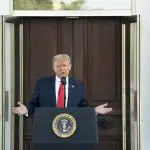The world of political commentary has certainly evolved, often resembling a circus more than a scholarly debate. Take, for instance, the recent jabs made by John Stewart concerning President Trump’s actions about Iran. Stewart’s argument hinges on the premise that the former president’s approach is misguided. Yet, one has to wonder: does he genuinely grasp the intricacies of Iranian politics, or is he merely throwing rhetorical confetti?
Stewart’s historical grounding seems shaky at best. He implies that the U.S. pulled out of a nuclear deal that was purportedly keeping Iran’s ambitions in check. This narrative glosses over the fact that past accords, such as the Joint Comprehensive Plan of Action (JCPOA), were fraught with flaws and did not effectively prevent Iran from continuing its nuclear advancements. Claims that Iran is close to obtaining a nuclear weapon, supported by figures like Israeli Prime Minister Netanyahu, are grounded in credible intelligence reports that the current regime in Tehran is accelerating its nuclear program. Yet, in Stewart’s world, these warnings appear to be mere background noise to his comedic routine.
Furthermore, the historical context that Stewart offers brings little clarity. He references American involvement in Iran, notably the 1953 coup against Prime Minister Mohammad Mossadegh, yet mischaracterizes key details. The misconception that Mossadegh was a democratically elected leader oversimplifies a complex situation. The reality is that his governance was contingent upon a blend of political dynamics, both domestic and international. This convoluted past doesn’t suggest that the U.S. should abstain from involvement today; rather, it should inform how we engage with a resurgent Iran that continues to threaten global stability.
Stewart’s rhetorical devices often include humor to divert from factual discussions. However, humor can only mask so much. When humor becomes a substitute for substantive debate, it risks trivializing pivotal issues—issues like nuclear proliferation that could have catastrophic global repercussions. Instead of offering a cogent analysis of America’s strategic alliances or the importance of supporting Israel as a bulwark against a nuclear-armed Tehran, Stewart leans into caricature and sarcasm, diminishing discourse.
Additionally, turning back to current solutions, it’s vital to recognize the critical role of U.S.-Israel relations in countering Iran’s provocations. Israel’s defensive actions against Iran are not unilateral aggression; they stem from an urgent need to safeguard its citizens from an armed adversary. Despite Stewart’s quips about American military equipment, it’s a fact that Israel’s military strategies often depend on American support under congressional mandates, reflecting a mutually beneficial alliance.
In conclusion, while comic jabs might entertain, they often fail to dissect the various layers of geopolitical complexity. A nuanced understanding of U.S.-Iran relations, the historical dynamics involved, and the current state of Middle Eastern affairs is essential for any genuine discussion. Thus, while Stewart may offer laughter, conservative audiences are called to prioritize understanding over humor when navigating the intricacies of international politics. After all, when it comes to security issues as critical as Iran’s nuclear ambition, misrepresentation and misunderstanding could lead to serious consequences. Both informed discourse and responsible action must take precedence if we are to foster a stable global environment.




